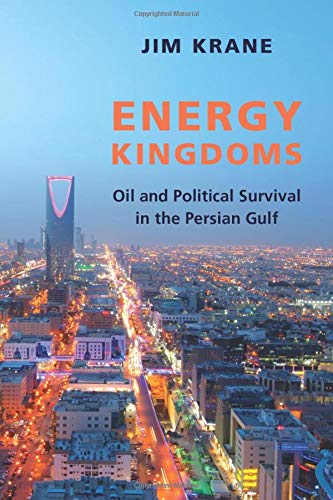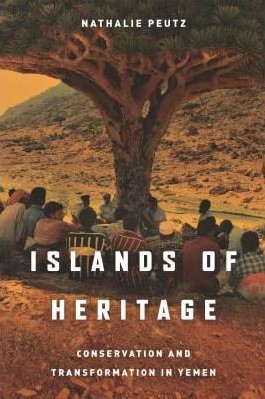Awards 2019
The AGAPS 2019 Winners
AGAPS Biennial Book Award
Dr. Jim Krane, Rice University
Energy Kingdoms: Oil and Political Survival in the Persian Gulf
Columbia University Press
In October 2018, the United Nations Intergovernmental Panel on Climate Change issued a report warning that at the current rate of global warming, extreme heat and water scarcity will affect hundreds of millions by 2030. Jim Krane seizes this moment to highlight the unique paradox of the Gulf monarchies facing the effects of climate change. The grandchildren of today’s Persian Gulf citizens could see their region become unfit for habitation by the end of the century unless their leaders curtail business-as-usual greenhouse gas emissions. And yet, policies driven by the imperative to come to grips with climate change will reduce the rents that ostensibly immunize authoritarian systems from demands for political rights. As Krane aptly puts it, “A country’s political and economic systems cannot be permanently arrayed against one another” (172). How Gulf oil producers handle this conundrum matters for us all: With the largest carbon footprints in the world, global climate goals cannot be achieved without major changes in production and consumption in the Gulf states.
In this wonderfully written account, Krane makes a significant contribution to theories of the rentier state. Classic rentier theory posits that top-down wealth distribution, including energy subsidies, is a key component of the authoritarian political bargain of oil-rich states: the state provides its citizens with cheap energy, along with other social and economic subsidies, in exchange for political loyalty. Krane’s rich account blends political and economic dimensions to challenge classic rentier theory and demonstrates that the Gulf states indeed possess the capacity to take climate action in order to sustain their economies and polities.
Through a series of case studies, we learn that energy subsidies may indeed be reduced without jeopardizing political stability, and in fact, they already have: Krane examines energy reform policies in the Persian Gulf, including a discussion of Iran’s reforms (2010–2017), an in-depth look at Saudi Arabia’s policy shifts, and an overview of changes in the other five Arab monarchies of the Gulf (2015–2017). Subsidy retractions, Krane argues, signify a fundamental change in the state-society relationship in the Gulf states. Due to a combination of fiscal crises, external pressure, a new generation of leaders, and security threats, citizens have—so far—accepted higher energy prices without demands for political change. While rentier theory implies that state-offered subsidies “cannot be reformed without upsetting the stability of the entire system,” Krane argues that “subsidies
must be reformed to save the system” (154).
With clear, concise language and powerful visual charts, Jim Krane makes the case for why we should all care about the “climate dilemma” confronting the Persian Gulf. He combines extensive personal and professional experience in the region, interviews with political elites, and a firm and wide grasp of economic data and the existing literature to give us keen insight into tensions between political structures and economic sustainability in this outstanding and timely study.
Honorable Mention
Dr. Nathalie Peutz, NYU Abu Dhabi
Islands of Heritage: Conservation and Transformation in Yemen.
Stanford University Press
Based on 10 years of extensive field research, Islands of Heritage weaves ethnography and history to offer a theoretically rich account of the construction of heritage among the people of Soqotra, the largest island of Yemen’s Soqotra Archipelago, in the years following the island’s listing as a UNESCO natural World Heritage site. Peutz’s work is particularly critical due to the ephemeral nature of the endangered Soqotri language.
The book meticulously traces how ordinary people come to understand and articulate heritage and how the Arab uprising in Yemen opened opportunities to demand cultural and linguistic rights, thereby challenging assumptions that heritage is a conservative notion. Instead, she shows how the struggle over heritage narratives is deeply political and transformative. In a region that is often seen as monolithic, and a country that is often seen only through the lenses of failed states and civil war, this unique and extensive examination of a seldom studied society offers original insights into the local effects of environmental heritage projects directed by international agencies. Islands of Heritage informs and educates readers interested in the impact of cosmopolitan initiatives for environmental conservation, and the integration of peripheral zones into regional and global political circuits of power.
AGAPS Dissertation Award
Dr. Laura Goffman, Georgetown University
Medical Frontiers: Health, Empire, and Society in the Gulf and Arabian Peninsula, 1862-1959
This dissertation offers a very detailed historical account of the origins of public health institutions in the Gulf from the second half of the 19th century, when steamship service connected the Gulf ports to British India, through the expansion of oil production after the Second World War. Goffman critically analyzes the Gulf as a frontier of empire, modernity, and epidemiology, in a highly engaging and readable manner. This extremely original piece of scholarship brings new knowledge to a heretofore under-researched field in Gulf studies while also making a valuable contribution to the fields of Indian Ocean and colonial history.
The study examines the ways in which colonial medical policies constructed the Gulf as a unified epidemiological and medical space. It also offers insights into how health policies participated in the categorization of local populations in terms of race, ethnicity, religion, and gender, strikingly echoing contemporary systems of implicit and explicit categorization. It not only builds on colonial archives but also on local documents, shedding light on how colonial representations and practices both confronted but also combined with local knowledge and practices. The dissertation is nuanced in its multiple approaches to the topic, not only documenting British studies of local diseases but also examining the ways in which local communities were simultaneously translating this knowledge and applying them in local contexts. In so doing, it questions the established power relations between the western powers and local populace, disrupting accepted binaries of knowledge-givers and -seekers. The study also seeks to connect the Arab and Persian Gulf regions into a historical whole, with indigenous ideas flowing in both directions. It also contributes to a growing body of historical scholarship that constitutes the entire Gulf region, rather than a single state, as its field of analysis.
The study goes a long way to “de-exceptionalizing” the Gulf by rooting it firmly within the larger narrative of medical practices of British and American missionaries and medical personnel working in tandem with larger concerns of creating safe spaces within the trade routes. The last chapter on the role of shared historical narratives of medical practices adds to the richness of the research, whereby local communities’ contribution and desire to document traditional medicine establishes health and sanitation as part of a continuing source of indigenous concern, not an imported idea associated with the post oil economy. This is precisely the kind of original and engaging scholarship that is needed to move the needle in the field Gulf historiography.
Honorable Mention
Dr. Elizabeth Derderian, Northwestern University
Displaying Culture: The Politics of Art, Liberalism and the State in the UAE
This dissertation offers a nuanced and insightful analysis of the transformation of cultural institutions in the United Arab Emirates over the decade that followed the announcement of the Louvre Abu Dhabi project in 2007, as the country endeavored to affirm itself as a transnational cultural hub. Based on months of rich and solid ethnographic fieldwork among art and culture professionals, the dissertation presents new empirical data on Emirati cultural policy but also offers a new and insightful way of examining the otherwise well-worn topic of museums and cultural politics in the Gulf. It examines how Emirati cultural policies offer a yet unexplored case of nation-building in a context where foreigners dominate cultural institutions by constituting the majority of their staff as well as the primary audience of cultural projects.
Navigating between the complex relations of creating cultures by non-citizens and etching the development of a national identity through cultural artifacts, the dissertation takes a nuanced approach to these apparently contradictory forces. The study analyzes established tropes of the kafala system, labor migration, and nation-building through the lens of culture and art, examining ways in which imagined communities create notions of nation and state, and legitimizing the contribution of non-state actors in the creation of state identity. The dissertation challenges the simplistic binary opposition between “local authenticity” and “global culture” that so many scholarly analyses of the contemporary art world in the Gulf tend to insist upon, thereby shifting our knowledge of this complex and dynamic cultural milieu in necessary new directions. While Derderian examines the ways that artwork—specifically that of resident foreigners—is used to define Emirati national identity, she also encourages us to think of art and culture as a transnational field standing above individual nation states.
AGAPS Graduate Travel Grant
Emilio Ocampo-Eibenschutz, Cornell University
Space, abolitionism, and empire: slave markets in the 19th C. Western Indian Ocean
In his paper, Ocampo-Eibenschutz examines how a specific site informed colonial knowledge production in the 19th century Western Indian Ocean. With a focus on slave markets in Muscat and Zanzibar, he situates these sites as dynamic spatial productions within British imperialism. Informed by new historiographies of East Africa, the Persian Gulf, and British abolitionism. He uses 19th century British sources to advance an argument for considering slave markets as important sites of colonial knowledge production informing British imperial advances in the Persian Gulf and East Africa alike. Reading a series of first-hand accounts of slave markets, together with parliamentary debates, newspaper articles, political diaries, and letters documenting the Western Indian Ocean slave trade, he focuses on space as it unfolded in British antislavery rhetoric, particularly during the second half of the 19th century, exploring the role of slave markets within the British imperial imagination in the context of a discursive and geopolitical shift associated with the re-imagination of Britain as an expanding, slave-less empire of free trade. Similarly, he analyzes how the slave market unfolded for visitors as a source of colonial knowledge production evoking civilizational commentary. He situates slave markets as spaces of rhetorical relevance for imperial interests and locates discursive production leading to the eventual prohibition of slave markets in 1873 as contributing to geopolitical shifts in the late 19th c. and to future conceptualizations of empire in the Western Indian Ocean.


